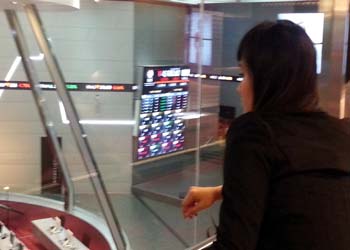Incentives in the Telecommunications Sector Still On Discourse
08:34:01 | 14 Sep 2015

Ilustrasi (dok)
JAKARTA (IndoTelko) - The Continuous depreciation of the Indonesian exchange rate have made businesses in the telecommunications sector needs to be on the lookout for the long term.
Minister of Communication and Informatics Rudiantara expected to issue a policy package that could be a sedative for the industry and take concrete action rather than continue to discourse in the media.
According to Bloomberg, Rupiah weakened 93.7 points, or 0.66% equivalent to Rp14 266 per US dollar at the close of trading Monday. In fact, the closing level yesterday, almost close to Rp14,300 rupiah per US dollar by the movement of the day was in the range of USD 14214 - USD 14 297 per US dollar.
In a discussion in his Office on Monday (7/9), Rudiantara still seen to be discoursing to appease the businesses doers because of the idea that was brought up like an old song on tangled tape in facing the upheaval of Rupiah against the US dollar.
There are at least three important steps that must be done by the government in cooperation with the telecom operators," said Rudiantara.
First is the importance of sustainable telecommunications industry development in the country. He explained that the 4G technology service is not just a concern of government, but also should be a concern of all stakeholders how ICT position in Indonesia may increase.
Secondly, in entering the data era, then efficiency must be done. Third, Rudiantara ask any telecommunication companies to pay attention to balance sheets in the performance of its financial statements.
Surely these three Minister's recipes are not an efficacious pills for telecom operators. If there is any assisting signal from the ministry it would only be a matter of obligation to transact in Rupiah. Which Rudiantara has held a meeting with the economic minister and Bank Indonesia to discuss the regulations of the obligation to use Rupiah in every transaction in the country both in cash and non-cash per July 1, 2015.
The regulation is stipulated in the Bank of Indonesia's Circular Notes (SEBI) 17/11/DKSP on the obligation to use Rupiah in the territory of the Republic of Indonesia (NKRI). However, for the cost of hedging affairs there has been no satisfactory decision of the Ministry to calm the operators down.
Rudiantara was only discoursing that the hedging costs are not charged to the customers of various operators and IT companies not to be charged with a high hedging costs.
"Let's say if it is US $2 billion a year then the hedging cost is calculated could reach US $ 80 million - US $ 100 million because Indonesia does not have a strong hedging market. That means no additional cost for the industry, who will bear it. The operator's vendor alone would not be charged the extra cost, as well as the operators who might want to bear but passed on to burden to the customer," Rudiantara said.
The Minister's solution offered is that if the cost of hedging carried out in the producer countries concerned about the cost of transportation and who will be benefited from the tax. According to him, these two options is actually not beneficial for Indonesia.
"If it can use the foreign exchange, but the most important thing is that the Indonesian telecommunications industry is engaged in the strategic sectors. So in the meantime, we will use the first two options and we will provide recommendations to the operator or vendor to the central Bank for it is still in its planning," he described.
Long-term
Chairman of the Association of Telecommunication of Indonesia (ATSI), Alexander Rusli revealed that the impact of Rupiah turmoil will be felt in the beginning of next year. "If until the end of this year the impact is imperceptibly, that means the purchasing power of consumers to telecommunications is still high. Besides we have set our the capital expenditures long time ago. Next year will begin to be felt as the US dollar finds a new balance point," Alexander explained. Alexander who is also Indosat CEO added that generally the Indonesian operators is budgeting their CAPEX between 28%-30% of revenue in advance. Amid these conditions, the budget guideline is still maintained by the operator's capex next year. Another thing that Alexander reminded that on the player side that the device price also rises given the Rupiah weakening and this is worsen by the weakening of purchasing power. "If the handsets price rose then the purchasing power fell, well, it can make slower migration from feature phones to smartphones," said Alex. Executive Director of ECONIT Advisory Group Hendri Saparini revealed that the desire of the activities in the telecommunications sector is very high. Only now its slowly slowing down as well. Hendri explained that the previous growth in the telecommunications industry have reached 10%, but now down in the range of 9%. According to Hendri, the government needs to do a long-term effort and strategies to deal with the current conditions. "So do not just control the Rupiah, but there is also an attempt to control the demand," Hendri said. (es)
Baca juga :
•
•
•
Chairman of the Association of Telecommunication of Indonesia (ATSI), Alexander Rusli revealed that the impact of Rupiah turmoil will be felt in the beginning of next year. "If until the end of this year the impact is imperceptibly, that means the purchasing power of consumers to telecommunications is still high. Besides we have set our the capital expenditures long time ago. Next year will begin to be felt as the US dollar finds a new balance point," Alexander explained. Alexander who is also Indosat CEO added that generally the Indonesian operators is budgeting their CAPEX between 28%-30% of revenue in advance. Amid these conditions, the budget guideline is still maintained by the operator's capex next year. Another thing that Alexander reminded that on the player side that the device price also rises given the Rupiah weakening and this is worsen by the weakening of purchasing power. "If the handsets price rose then the purchasing power fell, well, it can make slower migration from feature phones to smartphones," said Alex. Executive Director of ECONIT Advisory Group Hendri Saparini revealed that the desire of the activities in the telecommunications sector is very high. Only now its slowly slowing down as well. Hendri explained that the previous growth in the telecommunications industry have reached 10%, but now down in the range of 9%. According to Hendri, the government needs to do a long-term effort and strategies to deal with the current conditions. "So do not just control the Rupiah, but there is also an attempt to control the demand," Hendri said. (es)
Artikel Terkait
-
 English Ver. - 04:00:00 | 19 May 2024The real estate sector is observably shifting toward sustainability
English Ver. - 04:00:00 | 19 May 2024The real estate sector is observably shifting toward sustainability -
 English Ver. - 05:21:00 | 03 May 2024Primary drivers for IT infrastructure investments in the next year include ransomware prevention
English Ver. - 05:21:00 | 03 May 2024Primary drivers for IT infrastructure investments in the next year include ransomware prevention
Rekomendasi
Berita Pilihan
More Stories
PR Newswire




























































